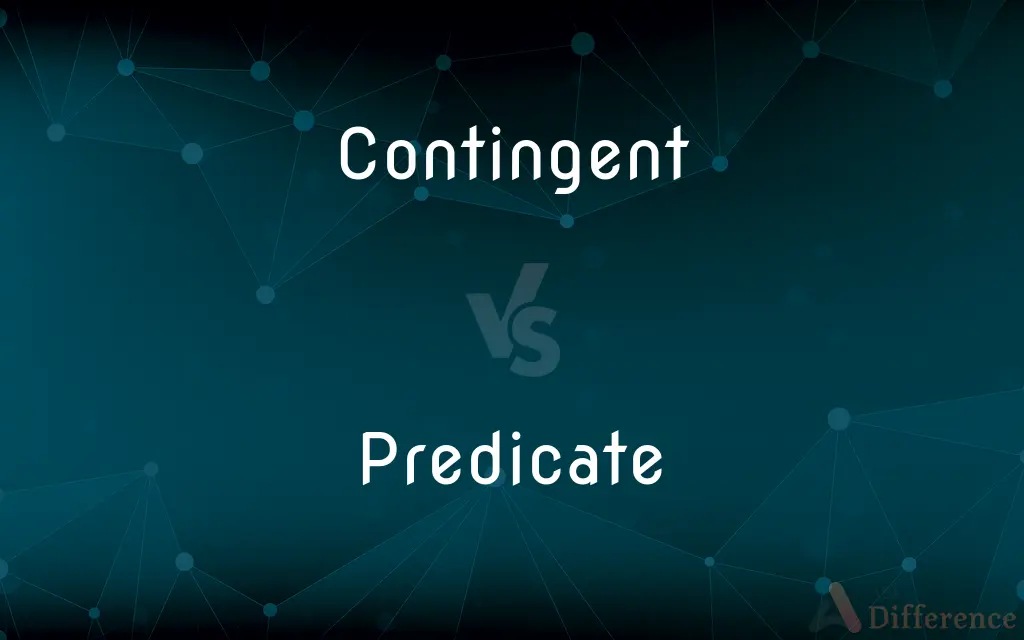Contingent vs. Predicate — What's the Difference?

Difference Between Contingent and Predicate
ADVERTISEMENT
Compare with Definitions
Contingent
Subject to chance
The contingent nature of the job
Predicate
To base or establish (a statement or action, for example)
I predicated my argument on the facts.
Contingent
Occurring or existing only if (certain circumstances) are the case; dependent on
His fees were contingent on the success of his search
Predicate
To state or affirm as an attribute or quality of something
The sermon predicated the perfectibility of humankind.
Contingent
A group of people sharing a common feature, forming part of a larger group
A contingent of Japanese businessmen attending a conference
ADVERTISEMENT
Predicate
To carry the connotation of; imply.
Contingent
Liable but not certain to occur; possible
"All salaries are reckoned on contingent as well as on actual services" (Ralph Waldo Emerson).
Predicate
(Logic) To make (a term or expression) the predicate of a proposition.
Contingent
Dependent on other conditions or circumstances; conditional
Arms sales contingent on the approval of Congress.
Predicate
To proclaim or assert; declare.
Contingent
Happening by or subject to chance or accident; unpredictable
Contingent developments that jeopardized the negotiations.
Predicate
To make a statement or assertion.
Contingent
(Logic) True only under certain conditions; not necessarily or universally true
A contingent proposition.
Predicate
(Grammar) One of the two main constituents of a sentence or clause, modifying the subject and including the verb, objects, or phrases governed by the verb, as opened the door in Jane opened the door or is very sleepy in The child is very sleepy.
Contingent
A group or detachment, as of troops or police, assigned to aid a larger force.
Predicate
(Logic) That part of a proposition that is affirmed or denied about the subject. For example, in the proposition We are mortal, mortal is the predicate.
Contingent
A representative group that is selected from or part of a larger group.
Predicate
(Grammar) Of or belonging to the predicate of a sentence or clause.
Contingent
An event or condition that is likely but not inevitable.
Predicate
Stated or asserted; predicated.
Contingent
An event which may or may not happen; that which is unforeseen, undetermined, or dependent on something future.
Predicate
(grammar) The part of the sentence (or clause) which states a property that a subject has or is characterized by.
Contingent
That which falls to one in a division or apportionment among a number; a suitable share.
Predicate
(logic) A term of a statement, where the statement may be true or false depending on whether the thing referred to by the values of the statement's variables has the property signified by that (predicative) term.
A propositional variable may be treated as a nullary predicate.
A predicate is either valid, satisfiable, or unsatisfiable.
Contingent
(military) A quota of troops.
Predicate
(computing) An operator or function that returns either true or false.
Contingent
Possible or liable, but not certain to occur.
Predicate
(grammar) Of or related to the predicate of a sentence or clause.
Contingent
(with upon or on) Dependent on something that is undetermined or unknown, that may or may not occur.
The success of his undertaking is contingent upon events which he cannot control.
A contingent estate
Predicate
Predicated, stated.
Contingent
Not logically necessarily true or false.
Predicate
(law) Relating to or being any of a series of criminal acts upon which prosecution for racketeering may be predicated.
Contingent
Temporary.
Contingent labor
Contingent worker
Predicate
(transitive) To announce, assert, or proclaim publicly.
Contingent
Possible, or liable, but not certain, to occur; incidental; casual.
Weighing so much actual crime against so much contingent advantage.
Predicate
(transitive) To assume or suppose; to infer.
Contingent
Dependent on that which is undetermined or unknown; as, the success of his undertaking is contingent upon events which he can not control.
Predicate
To base (on); to assert on the grounds of.
Contingent
Dependent for effect on something that may or may not occur; as, a contingent estate.
If a contingent legacy be left to any one when he attains, or if he attains, the age of twenty-one.
Predicate
To make a term (or expression) the predicate of a statement.
Contingent
An event which may or may not happen; that which is unforeseen, undetermined, or dependent on something future; a contingency.
His understanding could almost pierce into future contingents.
Predicate
To assert or state as an attribute or quality of something.
Contingent
That which falls to one in a division or apportionment among a number; a suitable share; proportion; esp., a quota of troops.
From the Alps to the border of Flanders, contingents were required . . . 200,000 men were in arms.
Predicate
To assert to belong to something; to affirm (one thing of another); as, to predicate whiteness of snow.
Contingent
A gathering of persons representative of some larger group;
Each nation sent a contingent of athletes to the Olympics
Predicate
To found; to base.
Contingent
A temporary military unit;
The peace-keeping force includes one British contingent
Predicate
To affirm something of another thing; to make an affirmation.
Contingent
Possible but not certain to occur;
They had to plan for contingent expenses
Predicate
That which is affirmed or denied of the subject. In these propositions, "Paper is white," "Ink is not white," whiteness is the predicate affirmed of paper and denied of ink.
Contingent
Determined by conditions or circumstances not yet established;
Arms sales contingent on the approval of congress
Predicate
The word or words in a proposition which express what is affirmed of the subject.
Contingent
Uncertain because of uncontrollable circumstances;
The results of confession were not contingent, they were certain
Predicate
Predicated.
Predicate
(logic) what is predicated of the subject of a proposition; the second term in a proposition is predicated of the first term by means of the copula;
`Socrates is a man' predicates manhood of Socrates
Predicate
One of the two main constituents of a sentence; the predicate contains the verb and its complements
Predicate
Make the (grammatical) predicate in a proposition;
The predicate `dog' is predicated of the subject `Fido' in the sentence `Fido is a dog'
Predicate
Affirm or declare as an attribute or quality of;
The speech predicated the fitness of the candidate to be President
Predicate
Involve as a necessary condition of consequence; as in logic;
Solving the problem is predicated on understanding it well
Share Your Discovery

Previous Comparison
Messiah vs. Prophet
Next Comparison
Banana vs. Coconut













































